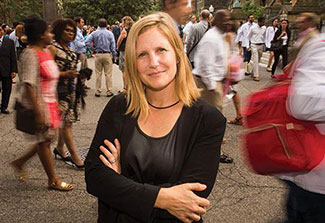Profile: Type 2 diabetes syndemic in India characterized by Fogarty Scholar Dr Emily Mendenhall
September / October 2020 | Volume 19, Number 5

Photo courtesy of Georgetown University
By Susan Scutti
Indian attitudes about type 2 diabetes took Dr. Emily Mendenhall by surprise. “People were kind of dismissive in Delhi, saying ‘Everybody has a little diabetes,’” said the former Fogarty Scholar. “This was very different than in the U.S., where there’s a lot of moral blame and people say, ‘You didn’t eat right, you didn’t exercise - it’s all your fault that you have diabetes.’” Research in India led to greater insight, which is exactly what she hoped to gain from her Fogarty fellowship, said Mendenhall.
Mendenhall had begun studying diabetes among Mexican immigrants while at Northwestern University, which inspired her to think about the disease “as an inter-connected condition that reflected social change.”
Re-envisioning a common American disease paved the way for research in a lower resource country. The scientists behind the Center for Cardiometabolic Risk Reduction in South Asia (CARRS) Surveillance Study - a community-based survey in India and Pakistan - learned of Mendenhall’s diabetes work and promised her freedom to design her own research if she joined them in Delhi with her yearlong Fogarty grant. Historically in India, type 2 diabetes was considered an illness of the elite, but CARRS data indicated a socioeconomic reversal as diabetes rates began to rise among less fortunate Delhi residents.
As a Fogarty Scholar, Mendenhall was able to develop her research skills, such as designing instruments, training researchers and analyzing data. Paired with Dr. Roopa Shivashankar of the CARRS study, Mendenhall developed two new research tools for an ethnographic study - one a qualitative interview covering five domains, the other a narrative interview focused on stress. Unable to speak Hindi, Mendenhall trained two research assistants to conduct interviews of 60 Delhi residents divided into age-and-sex-matched groups representing low-income, middle-income and high-income categories.
Everyone in Delhi, no matter their social status, reported feeling stressed within the rapidly transforming society, the interviews revealed. “People were dealing with important cultural experiences that elicited strong emotional responses,” Mendenhall explained. Both middle-and upper-income folks felt tension due to evolving expectations - Is conspicuous consumption necessary to maintain respect in this brave new society? If so, what must I buy? Yet, lower-income people struggled with “intense familial kinds of expectations” due to the need for amassing dowries and sending children to schools, she said. Diabetes was “experienced and perceived and embodied differently” by low-income patients compared to those with higher incomes, Mendenhall’s analysis indicated. The findings also showed an inequitable distribution of depression, with 55% of the lowest income participants reporting symptoms compared to 38% and 29% middle- and high-income participants, respectively. People with diabetes and low incomes were more likely to delay seeking care, have lower rates of treatment and higher levels of stress.
Overall, the Mendenhall team’s research, published in
Social Science and Medicine, suggested
synergies among diabetes, depression and social inequality in urban India.
Since her Fogarty fellowship, Mendenhall has begun using the term “syndemics” to describe similar co-existing epidemics she has studied in South Africa, Kenya and Ethiopia. Recently, Fogarty awarded the Georgetown University associate professor a global noncommunicable diseases research grant to examine the application of syndemics theory within a framework of implementation science.
“Because I am an anthropologist, and not a doctor or epidemiologist, I am an example of Fogarty taking a risk,” said Mendenhall. “Syndemics is a way to bring us all together to have a conversation about how interactions matter so fundamentally to what health and illness mean.”
More Information
-
Beyond co-morbidity: A critical anthropological perspective of syndemic depression and diabetes in cross-cultural contexts
Medical Anthropology Quarterly via PubMed, May 15, 2015 -
The Lancet Series: Syndemics
The Lancet, March 2, 2017 -
Profile: Emily Mendenhall
Provost's Distinguished Associate Professor, Edmund A. Walsh School of Foreign Service at Georgetown University - Emily Mendenhall's publication history as recorded by the National Library of Medicine's PubMed
- Grant:
Soweto Syndemics: A Two-Phase Study of Surveillance and Co-Morbid Experiences
supported through Fogarty's Global Noncommunicable Diseases and Injury Research program - Related publication:
Evaluating the mental health impacts of the COVID-19 pandemic: Perceived risk of COVID-19 infection and childhood trauma predict adult depressive symptoms in urban South Africa
Psychological Medicine, September 8, 2020 - Related news:
People in Soweto told us about their fears in the first weeks of South Africa's lockdown, co-authored by Dr. Emily Mendenhall
Modern Ghana, August 10, 2020 -
Diabetes news, resources and funding for global health researchers
To view Adobe PDF files,
download current, free accessible plug-ins from Adobe's website.
Related Fogarty Programs
Related World Regions / Countries
Related Global Health Research Topics